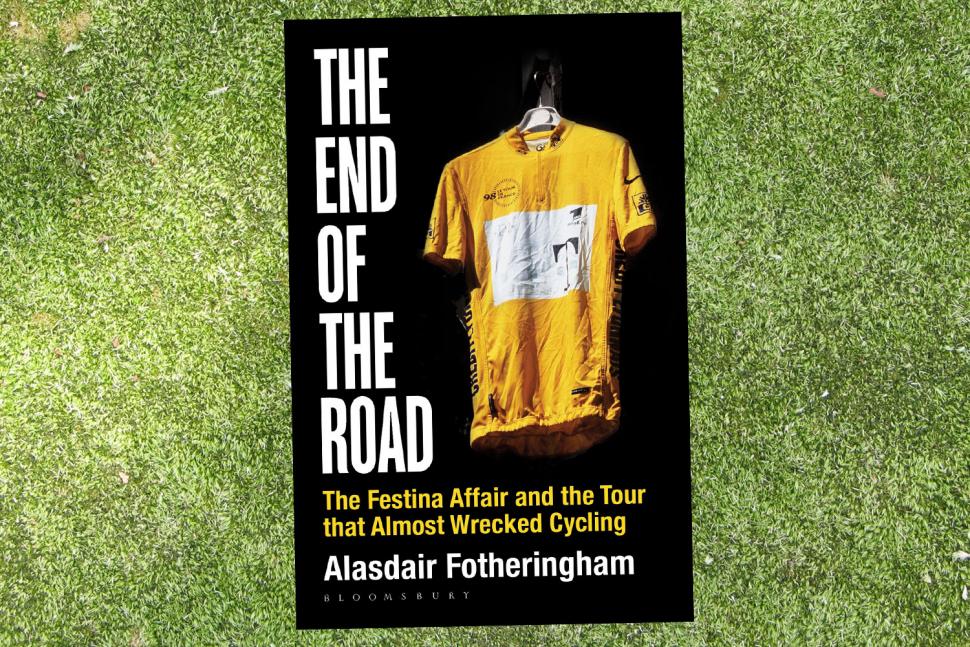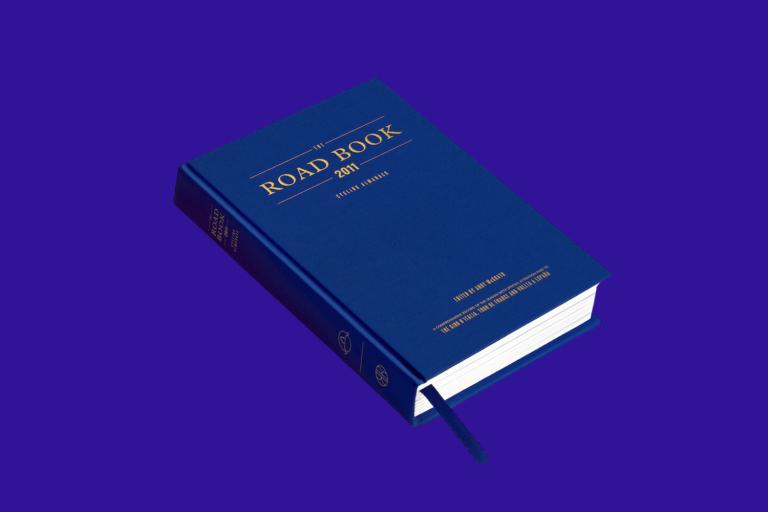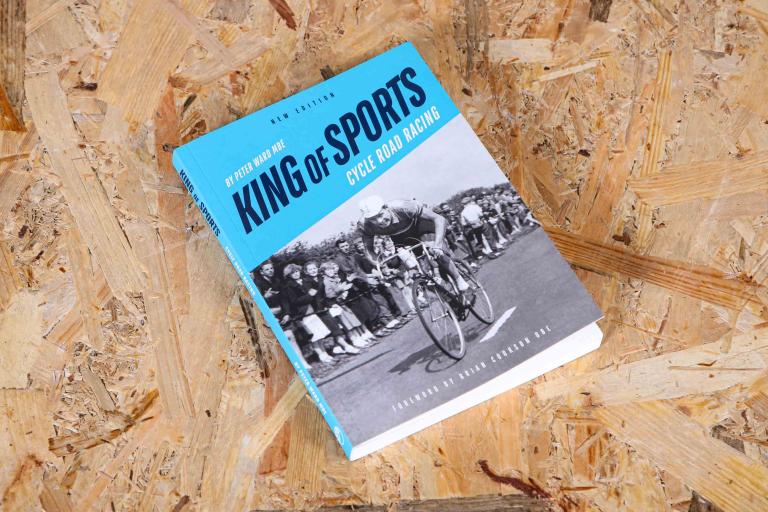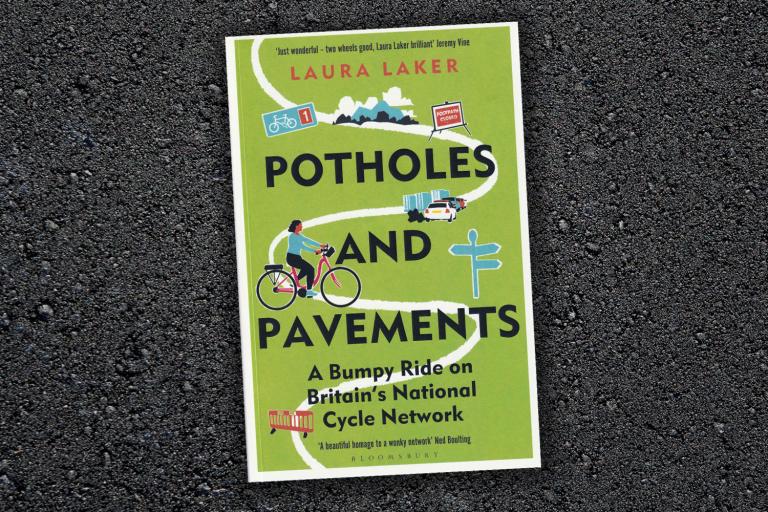- News
- Reviews
- Bikes
- Accessories
- Accessories - misc
- Computer mounts
- Bags
- Bar ends
- Bike bags & cases
- Bottle cages
- Bottles
- Cameras
- Car racks
- Child seats
- Computers
- Glasses
- GPS units
- Helmets
- Lights - front
- Lights - rear
- Lights - sets
- Locks
- Mirrors
- Mudguards
- Racks
- Pumps & CO2 inflators
- Puncture kits
- Reflectives
- Smart watches
- Stands and racks
- Trailers
- Clothing
- Components
- Bar tape & grips
- Bottom brackets
- Brake & gear cables
- Brake & STI levers
- Brake pads & spares
- Brakes
- Cassettes & freewheels
- Chains
- Chainsets & chainrings
- Derailleurs - front
- Derailleurs - rear
- Forks
- Gear levers & shifters
- Groupsets
- Handlebars & extensions
- Headsets
- Hubs
- Inner tubes
- Pedals
- Quick releases & skewers
- Saddles
- Seatposts
- Stems
- Wheels
- Tyres
- Health, fitness and nutrition
- Tools and workshop
- Miscellaneous
- Tubeless valves
- Buyers Guides
- Features
- Forum
- Recommends
- Podcast
review
 TheEndOfTheRoad.jpg
TheEndOfTheRoad.jpg£18.99
VERDICT:
So much more than an account of a single Tour: one of the most thorough explanations of the drug taking culture in cycling
Weight:
200g
Contact:
At road.cc every product is thoroughly tested for as long as it takes to get a proper insight into how well it works. Our reviewers are experienced cyclists that we trust to be objective. While we strive to ensure that opinions expressed are backed up by facts, reviews are by their nature an informed opinion, not a definitive verdict. We don't intentionally try to break anything (except locks) but we do try to look for weak points in any design. The overall score is not just an average of the other scores: it reflects both a product's function and value – with value determined by how a product compares with items of similar spec, quality, and price.
What the road.cc scores meanGood scores are more common than bad, because fortunately good products are more common than bad.
- Exceptional
- Excellent
- Very Good
- Good
- Quite good
- Average
- Not so good
- Poor
- Bad
- Appalling
Alasdair Fotheringham's book, The End of the Road - The Festina Affair and the Tour that Almost Wrecked Cycling, goes a long way to explaining the culture of drug taking in cycling. Arriving at a time when those involved in professional cycling are more prepared to talk about it, and followers more prepared to believe it, the book makes a fascinating read.
Spare a thought for Festina. No doubt they spent millions sponsoring a top level cycling team, hoping to benefit from a positive association with cycling. Instead, the word 'Festina' is inevitably associated with 'affair' or 'scandal', and has become shorthand for one of the most significant events in cycling's drug-taking history.
It is generally accepted that the 1998 Tour de France was when people finally started to take the problem of doping within cycling seriously. While this book does tell the story of that Tour, it is really about the drug use within the professional peloton at that time; the general acceptance of it, the logistics of doing it, the effect on racing, and more. Once that has been explained, it makes it easier to understand why we find ourselves in the position we are today, and why change is proving so difficult.
Ireland seems to have had more involvement in exposing the culture of drugs within cycling than you would expect for a nation of its size. Take Paul Kimmage's book, A Rough Ride, described in this new book as 'the first book to deal head on with drugs in cycling in any language', which was rightly included in our recommendations for your essential cycling library.
A few years later both Emma O'Reilly and David Walsh were instrumental in bringing about the downfall of Lance Armstrong.
Even Pat McQuaid has had a part to play as president of the UCI, even if not always in such a positive way.
It seems entirely fitting, therefore, that this Tour had its Grand Depart in Dublin.
Total breakdown
Things started badly for the race, and then got worse: whole teams were being removed from the race, or choosing to leave; there was a total 'breakdown in communication between riders, journalists, and organisers'. The peloton simply refused to ride at all, let alone race, and some parties even felt that 'it would have been the best for cycling if the Tour had stopped in Aix-les-Bains'.
Fotheringham will have an extensive list of contacts in the sport as a result of his many years of writing articles for the specialist and non-specialist press, as well as a few books – but until a few years ago I doubt that many of those contacts would have been willing to provide the information and interviews that make this book such a compelling read. Furthermore, I suspect that even if he had that information few people would have been prepared to accept that things were as bad as reported – as was the fate of some of the pioneering whistleblowers such as those already mentioned.
There have, of course, been numerous other books that tell us something about the issues of doping, although few are quite so thorough and well-informed; some even relate to this Tour – Willy Voet's Breaking the Chain, for example, 'a slim autobiography published following his arrest [on the way to this Tour] and sixteen days in prison'. It was this arrest that led to the chain of events that plunged the sport of cycling into the crisis that it is still resolving.
Fotheringham's book has the advantage of arriving on the scene at a time when attitudes to doping have changed significantly, which must make for more willing sources for his material and a more receptive audience – and a very interesting read.
Verdict
So much more than an account of a single Tour: one of the most thorough explanations of the drug taking culture in cycling
road.cc test report
Make and model: The End of the Road by Alasdair Fotheringham
Size tested: n/a
Tell us what the product is for, and who it's aimed at. What do the manufacturers say about it? How does that compare to your own feelings about it?
From Bloomsbury:
The Tour de France is always one of the sporting calendar's most spectacular and dramatic events. But the 1998 Tour provided drama like no other. As the opening stages in Ireland unfolded, the Festina team's soigneur Willy Voet was arrested on the French–Belgian border with a car-load of drugs. Raid after police raid followed, with arrest after arrest hammering the Tour. In protest, there were riders' strikes and go-slows, with several squads withdrawing en masse and one expelled. By the time the Tour reached Paris, just 96 of the 189 starters remained. And of those 189 starters, more than a quarter were later reported to have doped. The 1998 'Tour de Farce's' status as one of the most scandal-struck sporting events in history was confirmed.
Voet's arrest was just the beginning of sport's biggest mass doping controversy – what became known as the Festina affair. It all but destroyed professional cycling as the credibility of the entire sport was called into question and the cycling family began to split apart. And yet, ironically, the 1998 Tour was also one of the best races in years.
The End of the Road is the first English-language book to provide in-depth analysis and a colourful evocation of the tumultuous events during the 1998 Tour. Alasdair Fotheringham uncovers, step by step, how the world's biggest bike race sank into a nightmarish series of scandals that left the sport on its knees. He explores its long-term consequences – and what, if any, lessons were learned.
Tell us some more about the technical aspects of the product?
Title: The end of the road
Author: Alasdair Fotheringham
Publisher: Bloomsbury
Date: 5/5/16
Format: Hardback
Pages: 344
ISBN: 9781472913029
Price: £18.99
Did you enjoy using the product? Yes
Would you consider buying the product? Yes
Would you recommend the product to a friend? Yes
Use this box to explain your score
A thoroughly excellent read.
About the tester
Age: 55
I usually ride: My best bike is:
I've been riding for: Over 20 years I ride: Every day I would class myself as: Expert
I regularly do the following types of riding: commuting, touring, club rides, sportives, general fitness riding




The size of milk collection tankers...
The NZ Herald has never let accuracy get in gthe way of ragebait.
You did. But you also said "don't do things just because 'real cyclists' do them" which implies, well it doesn't so much as imply as much as state,...
I have the same light with the small Bluetooth remote to quickly switch modes. Overall, it's fantastic. My main gripe with it is when it reaches...
Because the price points are so wide between 105 and DA.
"blend in by day, stand out at night" I don't really want to blend in by day.
That's irrelevant. Why should the customer be forced to pay for all the sports that they dont watch? Why have to pay for football when I don't want...
A tragedy - sounds like one of those robotaxis though, are they allowed here? https://www.bbc.co.uk/news/articles/ce3le1z892vo
Great, thanks for your reply - much appreciated!
We have a new BKRY here in Cvrshm.